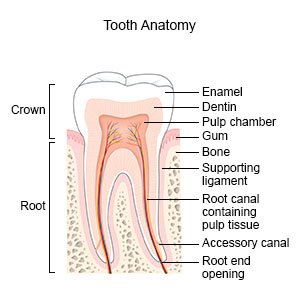Tooth Extraction
Medically reviewed by Drugs.com. Last updated on Aug 4, 2025.
AMBULATORY CARE:
What you need to know about a tooth extraction:
A tooth extraction is a procedure to remove 1 or more teeth. Your healthcare provider will talk to you about how to prepare for this procedure. He or she will tell you what medicines to take or not take on the day of your procedure.
 |
What will happen during a tooth extraction:
Your dentist or oral surgeon may use medicine to numb the gum around the tooth and dull the pain. You may still feel pressure or pushing during the procedure. He or she may also give you medicine to keep you asleep and free from pain during the procedure. Your surgeon will first use a tool to loosen your tooth. When the tooth is loose enough, the surgeon will use forceps to pull the tooth out. He or she may rinse the site with a sterile solution. The surgeon will apply gauze on the extraction site and ask you to bite down to help control bleeding.
What will happen after a tooth extraction:
You may have light bleeding for up to 12 hours after your procedure. You may also have pain, swelling, and trouble opening your mouth completely.
Risks of a tooth extraction:
- You may bleed more than expected or get an infection. You may have trouble fully opening your mouth for a longer period of time than expected. You may develop dry socket. Dry socket is a condition that prevents a blood clot from forming on the extraction site as it should, or it gets dislodged. Dry socket can cause severe pain. A part of the bone that holds your tooth in place may be broken during the tooth extraction. This can cause your upper and lower teeth to become misaligned. It can also lead to an infection or tingling or numbness.
- The top part of your tooth may break while it is being pulled. Your surgeon may need to cut your gum or part of your bone to remove the rest of the tooth. The nerve near the root of your tooth may be injured during this surgery.
Related medications
Seek care immediately if:
- You have bleeding that has not decreased within 12 hours after your tooth extraction.
Contact your dentist or oral surgeon if:
- You have a fever.
- You have severe, throbbing pain and swelling that do not improve with treatment.
- You have a foul taste or drainage coming from the extraction site.
- You feel like your teeth have moved or that your teeth are not aligned.
- You have numbness or tingling in your mouth.
- You still cannot fully open your mouth 1 week after your tooth extraction.
- You have questions or concerns about your condition or care.
Medicines:
You may need any of the following:
- Acetaminophen decreases pain. It is available without a doctor's order. Ask how much to take and how often to take it. Follow directions. Acetaminophen can cause liver damage if not taken correctly.
- Prescription pain medicine may be given. Ask your healthcare provider how to take this medicine safely. Some prescription pain medicines contain acetaminophen. Do not take other medicines that contain acetaminophen without talking to your healthcare provider. Too much acetaminophen may cause liver damage. Prescription pain medicine may cause constipation. Ask your healthcare provider how to prevent or treat constipation.
- Take your medicine as directed. Contact your healthcare provider if you think your medicine is not helping or if you have side effects. Tell your provider if you are allergic to any medicine. Keep a list of the medicines, vitamins, and herbs you take. Include the amounts, and when and why you take them. Bring the list or the pill bottles to follow-up visits. Carry your medicine list with you in case of an emergency.
Self-care:
- Keep the gauze in place for 2 hours after your procedure. This helps to control bleeding by forming a blood clot.
- Do not rinse your mouth for 24 hours. This helps decrease your risk for dry socket.
- Do not smoke or drink from a straw for 3 days. You may develop a dry socket if you smoke or use a straw.
- Eat only soft foods and liquids for 24 hours. This helps control pain.
- Apply ice on any swollen areas of your face for 15 to 20 minutes every hour or as directed. Use an ice pack, or put crushed ice in a plastic bag. Cover it with a towel before you apply it to your skin. Ice helps prevent tissue damage and decreases swelling and pain.
- To help decrease swelling, sleep with your head elevated. Do not sleep on your side.
- Avoid exercise as directed. Exercise can increase your blood pressure and make your extraction site bleed.
Follow up with your dentist or oral surgeon as directed:
Write down your questions so you remember to ask them during your visits.
© Copyright Merative 2025 Information is for End User's use only and may not be sold, redistributed or otherwise used for commercial purposes.
The above information is an educational aid only. It is not intended as medical advice for individual conditions or treatments. Talk to your doctor, nurse or pharmacist before following any medical regimen to see if it is safe and effective for you.
Further information
Always consult your healthcare provider to ensure the information displayed on this page applies to your personal circumstances.
